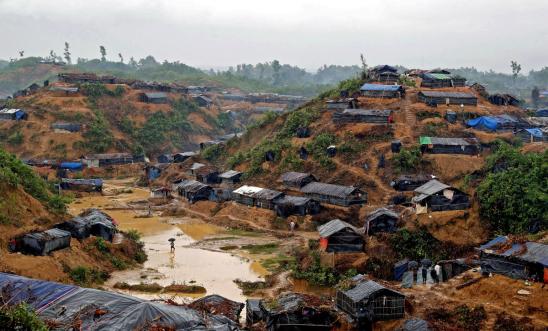
The AI Germany report on the Rohingya

The following is an excerpt from a report by Bernhard Hertlein of Amnesty International Germany.
World's largest refugee camp in Kutupalong
Bangladesh alone took in nearly one million Rohingya in August 2017 and the months that followed. Most remain in the country, with a large number - at times as many as 700,000 - in the Kutupalong camp in the south-eastern district of Cox's Bazar. Despite international protests, the Bangladesh government additionally set up another camp on Bhashan Char, a remote and previously uninhabited island in the Bay of Bengal. The protests by Amnesty International, among others, were based on the remoteness of the island, which not only makes it difficult for the residents to communicate with the outside world, but also poses life-threatening risks in the event of a major storm. Today, more than 30,000 Rohingya live on the island.
Amnesty International calls for more and longer-term assured international support.
Fires and Floods
The inadequate and dangerous accommodation in the largest refugee camp, Kutupalong, has been the subject of public discussion. If floods or fires occur the residents are largely unprotected and cannot flee due to the location of their camp and the surrounding security fences. The disasters have destroy many small businesses that residents have established. Of the little that the refugees had saved from their homes in Myanmar, much was lost.
Some camp residents work outside the camps during the day. However, this is often connected with the payment of high bribes. The reaction of the population in the area are divided. Some welcome the support, others fear cheaper competition on the local labour market.
Criminal business with drugs and prostitution
In the evenings, when the camp gates are completely closed, criminal gangs increasingly take control in Kutupalong. They compete for supremacy in drug trafficking and forced prostitution. In October 2020, the situation escalated for the first time. At least eight people died in fighting between opposing groups; hundreds were injured. In mid-July, Human Rights Watch documented a total of 26 most serious crimes in the camp for the period January to April 2023, including murder, hostage-taking, torture, rape and sexual abuse. According to Human Rights Watch, corrupt security forces are partly responsible for the lack of security in the camp.
Rohingya leader Mohib Ullah assassinated.
The lack of security in the Kutupalong camp was highlighted when human rights activist Mohib Ullah was shot dead by unknown persons in September 2021. The then 48-year-old had repeatedly addressed the public as a spokesman for the Rohingya, including in 2019 at the UN Human Rights Committee. He was also one of the plaintiffs demanding that the U.S. corporation Meta take responsibility and pay compensation for the consequences of the hate messages against the Rohingya spread on Facebook in August 2017.
Freedom of Movement, Access to Education and other Restrictions
The residents of the camps suffer from the conditions imposed by the camp administration. Access to education, freedom of movement and assembly are massively restricted. Money transactions are generally prohibited. Anyone who installs a financial app on their cell phone runs the risk of being arrested for forming a criminal organization. To avoid arrest, residents often pay bribes out of necessity. There are camp schools for the children, but they are strictly regulated in terms of time and subject matter. Burmese is strictly prescribed as the language of instruction. Teachers have already been arrested. During the Corona pandemic, there were almost no classes at all.
Return to Myanmar not in sight
The Bangladeshi government - like India - has tried to negotiate with the military regime in Yangoon to secure the safe return of the Rohingya. These negotiations have all failed since 2017. Amnesty International cautions that the refugees themselves must be included in the negotiations and decisions on the conditions for a possible return. Since the military coup in Myanmar in November 2021, the chances have decreased massively.
Our blogs are written by Amnesty International staff, volunteers and other interested individuals, to encourage debate around human rights issues. They do not necessarily represent the views of Amnesty International.
0 comments